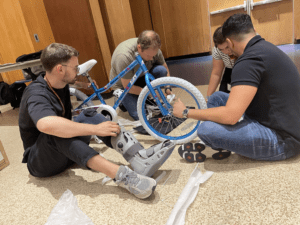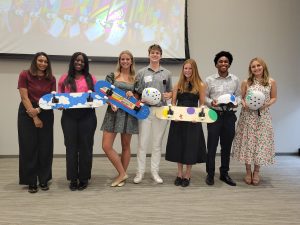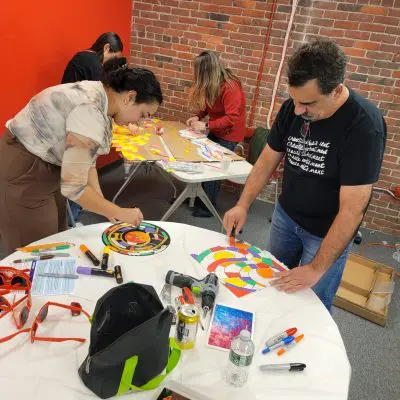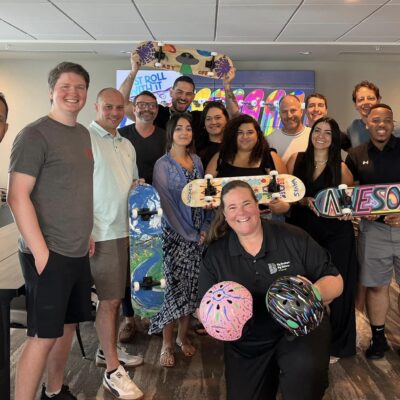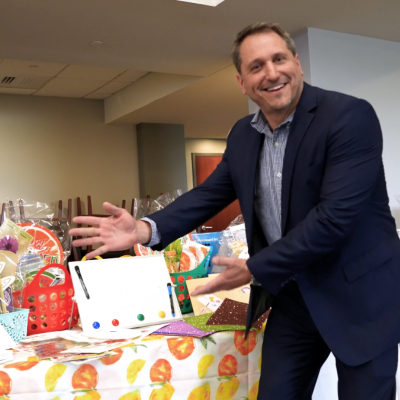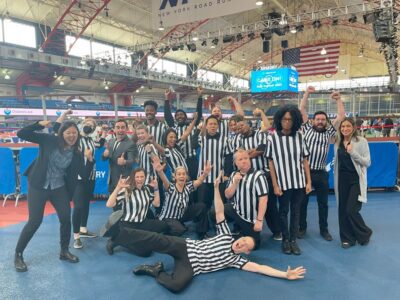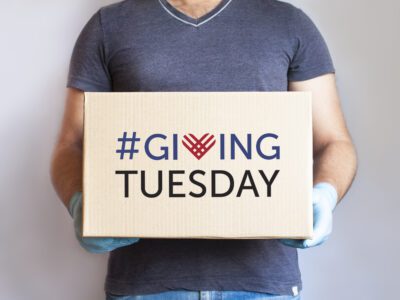Team building events are some of the most memorable experiences teams can share. It’s something I’ve personally witnessed time and time again—teams laughing, learning, bonding, and creating memories together.
As an event facilitator at TeamBonding, I’ve become incredibly passionate about my role in creating moments of togetherness and growth. I’ve been in this role for over 20 years, and I’ve worked all the way up to Director of Facilitator Training!
Of course, I’m just one of many professionals at TeamBonding who truly embody what it means to be an event facilitator.
We have a full team of talented and hardworking facilitators who put on incredible events every day, and each one has a positive impact on the lives of participants.
Today, I’d like to provide some insight into what team building facilitators do!
What Is a Facilitator? Meaning of the Role
When I tell someone I’m a facilitator, I’ll often get a quizzical look and a few questions. Team building facilitation isn’t the most common of careers, after all. So let’s start there: what is a facilitator?
Generally speaking, a facilitator is someone who runs an event, ensuring activities run smoothly and everyone has a good time.
That second part, making sure everyone has a good time, is the primary focus for team building facilitators. It’s all about the power of play and connection, which is why I like to describe facilitating events as getting adults to play nicely in the sandbox.
The shared experience of the participants is where the magic happens. These experiences foster things like:
- Togetherness: Team experiences foster a sense of connection and encourage bonding between colleagues.
- Trust Building: Shared activities help create trust between team members in a natural, low-pressure setting.
- Communication: Participants learn to listen, share ideas, and collaborate more effectively.
- Morale Boosts: Positive, fun, and natural experiences boost energy and enthusiasm, which is carried back to the workplace.
- Empathy & Understanding: Playful or reflective interactions can help coworkers better understand one another’s strengths, challenges, and personalities.
All that’s to say that my job as a team building facilitator is to engage participants in a shared learning experience that helps them bond, learn, and see their coworkers in a different light.
Why I Love Being a Team Building Facilitator

A group of facilitators at a Quickfire Olympics event.
Every time I organize an event, I need to ensure that the participants are engaging in the event, working together, and having fun! After years spent facilitating events, I’ve only become more passionate about it.
I’ve seen the impact these events have on people, especially when they’re perfectly planned, and it brings a smile to my face to see team members engaging in new ways.
Some of my favorite programs to facilitate are charity events. With programs like Play it Forward and Just Roll With It, I get to be a part of something bigger alongside teams while we give back to those in need.
I also love facilitating game shows! While Corporate Feud may not have the same impact on the community as a charity event, seeing 200 people laughing and having a blast definitely feeds a part of my soul.
To me, event facilitation is really about bringing everything you can to an event to provide an engaging and memorable experience for the participants.
It’s not about my experience—it’s about the participants, their experiences, and what they want to get out of the event.
The TeamBonding Facilitation Process
Being a team building facilitator might sound simple, but there’s so much that goes into it before the participants even show up at the event.
That said, whether it’s charity team building, game shows, or group events, the basic steps are almost always the same.
Here’s a zoomed-out view of what it looks like:
1. Preparation
The first step in facilitating an event is preparation. This step accounts for a large chunk of the entire process. Sure, the event is the fun part, but most of my time is spent getting everything ready so the event goes off without a hitch.
As a TeamBonding facilitator, I consider numerous factors and make extensive preparations beforehand. Facilitators must consider aspects that may not occur to the participants or the leaders who schedule these events.
Who is the client, and what are they looking for?
First, I learn who the client is and what they’re looking for. I want to understand as much as possible about:
- The members of their team
- Their goals for their team
- What they hope to achieve from the event
- What event(s) they have in mind, or if they haven’t picked any, which events I’d suggest for them
This process continues until I feel that I have fully understood the client and have identified the best possible event for their team.
This is essentially an information-gathering process. I need to know who I’m working with and what their goals are so I can facilitate an event they’ll love.
What preparations and changes are needed to check all the boxes?
Once I know what we’re doing and understand the client, it’s time to start prepping for the event.
Since TeamBonding customizes each event to suit the client, this is all about making adjustments to the program to best suit the client’s needs and goals.
This aspect also includes coordinating logistics—such as transportation and refreshments—and gathering the necessary materials, tools, and resources for the event.
What do we need to do leading up to the day of the event?
Once I have everything planned and prepared, my focus shifts towards the day of the event. I keep in close contact with the participants and other relevant parties (like the charities) to check for any last-minute changes.
Sometimes I need to make accommodations to ensure things run smoothly, but not always. Regardless, this step also involves planning for the unexpected—you need to be adaptable.
You can make all the preparations in the world, but life is unpredictable. Things happen, schedules can change, and you need to be able to make those adjustments on the fly.
For example, if we have an outdoor event, we like to arrange a backup indoor location in case the weather throws a wrench in our plans.
Y’all ready for this?
Eventually, you’ll reach the day of the event—that’s where the fun begins! If you’ve done your preparation well, the day of should be a lot less stressful and give you the ability to focus on the moment.
For leaders, this allows them to bond with their team and get their own benefits out of the event. And for facilitators like me, this lets us focus on making sure people are having a good time in the moment.
2. Initial Hesitation
When the event kicks off, there’s always some initial hesitation from participants. This is when you really have to embody the role of a team building facilitator.
In my experience, you have no more than three minutes to do all of the following:
- Take command of the room
- Get everyone to believe in you, the event, and the experience
- Get the participants to understand that you’re not there to teach them—you’re there to provide an experience
- Build energy and rapport with the group so they can loosen up
- Help get the participants ready for the event to come
Nailing these first several minutes is one of the most challenging aspects of being a facilitator (at least for me).
You only have a small window to make all that happen, and it’s not easy to take charge of a room while energizing and engaging the audience.
Being able to read the room is key. A good facilitator can tell:
- When people are feeling shy or detached
- The best ways to break the ice for each group—whether that’s through a quick game, jokes, encouraging conversation, or some other method
Once you’ve made it past the initial hesitation and started the event, things tend to fall into place.
If you’ve done the proper preparations and made it through the hesitation, having a fun and impactful team building experience will be inevitable at this point.
3. Lasting Impacts
The end of the event is not the end of my job as a team building facilitator.
Facilitators need to ensure that their events are successful and have lasting impacts, which is why we closely analyze our events post-completion.
The first way I gauge the event’s success is through on-site feedback. I ask myself questions like these about the participants:
- Was everyone engaged?
- Were they smiling, laughing, and having a good time?
- Did they learn new skills and strengthen their bonds?
- Did they have an impactful experience?
A good facilitator can read the room and see the energy and passion during the event. Using that feedback during the event is crucial to maintaining the energy, and it also provides valuable insight into the event’s success.
There are also other forms of feedback I look for:
- Verbal appreciation: Participants often thank me and my fellow facilitators in person after the event, which is always a good sign. Sometimes energy can be hard to read, and those direct thanks can clarify things.
- Repeat customers: If someone comes back for another event, it’s likely they had a good time at the first one, which is another great sign. Having customers return again and again is the best feedback a facilitator can receive.
- Surveys: Providing feedback forms and surveys after the event is another way to collect insights. I don’t always use these, but they can be a great way to identify areas for improvement and make your future events even better.
Essential Skills for Team Building Facilitators
To wrap things up, let’s review what it takes to handle the role of a team building facilitator. When I hire and train new facilitators for TeamBonding, I look for specific qualities in potential candidates:
- Work Well Under Pressure and Be Flexible: Facilitators need to be comfortable working in time-sensitive situations where they have to make changes on the fly.
- Problem-Solving Skills: Being able to quickly solve problems, whether with the event or with participants, is key.
- Professional Presentation: Appearances play a big role in how others perceive you, so facilitators need to present themselves professionally.
- Public Speaking: Facilitators require public speaking skills to communicate effectively, manage a crowd, and foster employee connections.
- Ability to Lead: The ability to lead and guide participants through an event is essential.
- Time Management: Participants only have so much time, and facilitators have to manage time effectively throughout the event.
- Organization: During the planning stage, in particular, expert organization skills are a necessity.
- Dependability: Throughout the event, facilitators must be incredibly reliable to ensure that things run smoothly.
- Enthusiasm, Energy, and Presence: A certain amount of charisma is necessary for a facilitator to really capture the audience’s attention and provide an engaging experience.
Energize Your Events with TeamBonding Facilitators!
In my years at TeamBonding—as both a team building facilitator and Director of Facilitator Training—I’ve seen firsthand just how challenging event facilitation can be.
From the earliest stages of planning to judging the impact of an event, being a facilitator is a complex and time-consuming process.
But that’s why facilitators like me are here—we help take the load off of the companies hosting these events so they can focus on enjoying themselves alongside their teams.
If you’re ready to energize your events with TeamBonding facilitators, meet our team of expert facilitators. I can confidently say we have the best of the best. Trust me, we’re here to help you create an unforgettable team experience. Get in touch today!
Think you have what it takes to become a TeamBonding facilitator? Apply today!

